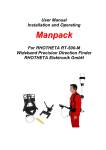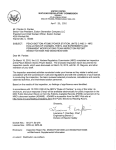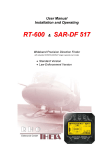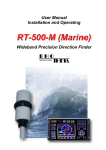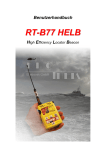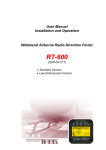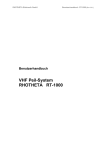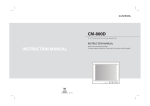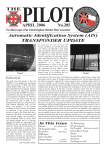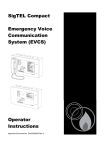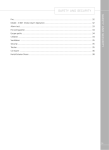Download RT-B77 HELB - RHOTHETA America
Transcript
User Manual RT-B77 HELB High Efficiency Locator Beacon RHOTHETA User Manual Personal Locator Beacon RT-B77 HELB Edited by: RHOTHETA Elektronik GmbH Kemmelpark Dr.-Ingeborg-Haeckel-Str. 2 82418 Murnau Germany Tel.: Fax: +49 8841 4879 - 0 +49 8841 4879 - 15 Internet: E-Mail: www.rhotheta.de [email protected] Copyright RHOTHETA Elektronik GmbH All rights reserved Issue: [2010/03/25] [Rev 1.05.a] NOTE The manufacturer reserves on making modifications at any time and without previous information of the here described product. Page 2 of 18 RHOTHETA User Manual Personal Locator Beacon RT-B77 HELB Contents: 1 USE, CHARACTERISTICS AND WARNINGS 4 1.1 Use 4 1.2 Characteristics and Special Features of the RT-B77 HELB 4 1.3 Warnings 5 2 SHORT DESCRIPTION 6 3 OPERATION 8 3.1 Short Instruction for Use 8 3.2 Arming the Beacon 8 3.3 Activation 3.3.1 Manual Activation 3.3.2 Pull-Away Activator 3.3.3 Water Contact 9 9 10 10 3.4 Switching OFF 11 3.5 Self Test 12 3.6 Training Mode 13 3.7 Service Mode 3.7.1 Entering 3.7.2 Exiting 13 13 13 4 TECHNICAL DATA 14 5 MAINTENANCE 15 5.1 Cleaning 15 5.2 Battery Change 15 6 DECLARATION OF CONFORMITY 17 7 NOTES 18 Page 3 of 18 RHOTHETA User Manual Personal Locator Beacon RT-B77 HELB 1 Use, Characteristics and Warnings 1.1 Use The RT-B77 HELB is a microprocessor-controlled personal locator beacon (PLB) transmitting on the international civil distress frequency 121.500 MHz. The RT-B77 HELB is designed for professional use under rough conditions. It is optimised for MOB (man over board) applications. Therefore, in use on water, the RT-B77 HELB shall be fixed on a life jacket, a survival suit, a life raft or other qualified personal safety equipment. 1.2 Characteristics and Special Features of the RT-B77 HELB • The RT-B77 HELB is a light weight device offering high wearing comfort • Easy to use and extremely reliable in operation • It features a self-test to check all important functions • Automatic activation by water immersion sensor • Activation can be coupled to inflating life west with pull-away-contact • Very large transmitting range through very high output power (up to 2 W) • Long-time transmitting management • Functional and operating feedback by LED and built-in speaker • Status messages in clear text via integrated speaker • Beacon-ID programmable by user (factory setting: serial no.) • Beacon-ID transmitted as digital code • Beacon-ID transmitted as clear voice message (AM) • Pre-selectable test/training frequency • Waterproof housing • Comfortable verifiability and maintenance via IrDA interface • Software update via serial interface endurance through Page 4 of 18 microprocessor-controlled power- RHOTHETA User Manual Personal Locator Beacon RT-B77 HELB 1.3 Warnings Warning: Activate the beacon only in case of emergency. Activation by fault may cause an expensive rescue action, which has to be paid by the causer. Activation on the distress frequency (121.500 MHz) for test or training purposes without permission of the regulatory authority of the relevant country is strictly forbidden. Warning: The RT-B77 HELB is not buoyant. For operation on water the unit has to be fixed on a buoyant safety equipment, e.g. a life jacket. Combined with the specially designed bag it is buoyant as well. Warning: Activation and transmission on any test frequency can disturb communication on the air band and occurs on the own risk of the RT-B77 HELB user. When performing any rescue training or transmissions on a training frequency, the user has to ask for permission at the appropriate local authority of the country where the beacon is used. The manufacturer assumes no liability for any consequences arising from unlawful use. Warning: Don’t expose the RT-B77 HELB to extremely strong magnetic fields; these may cause unwanted activation or deactivation. Page 5 of 18 RHOTHETA User Manual Personal Locator Beacon RT-B77 HELB 2 Short Description Page 6 of 18 RHOTHETA User Manual Personal Locator Beacon RT-B77 HELB Pos. Designation Function Chapter 1 Monopole Antenna Straight monopole antenna - 1a 90° Antenna 90° angled antenna for use with a life jacket - 2 Function Indication LED The GREEN LED is blinking when the RT-B77 HELB is activated or the self test indicates no failure - 3 Water Immersion Activator Water sensor for automatic activation if beacon is immersed into water 3.3.3 4 Status LED LEDs (GREEN, RED) for visual status messages 5 - Activation button for manual activation of the beacon 3.3.1 6 Pull-Away Activator This clip activates the beacon manually if pulled away by hand or automatically if the cord is connected to the release of a life jacket 3.3.2 7 IrDA Interface IrDA interface, optical In/Out-port used for maintenance and programming of customer specific test/training frequency and beacon identification Separate service manual 8 Rotary Switch OFF / ARM Main switch which is used to - arm the beacon. - switch off all working modes of the beacon 9 Speaker Output of voice status messages and sweep modulation of distress signal as acoustic feedback. 10 11 Test LED 12 Battery Pack 13 Short Instruction 3.2 - Test button used to activate self test or to swap into training mode. 3.5 3.6 The YELLOW LED is blinking while unit is carrying out a self test when unit is switched into the training mode 3.5 3.6 The battery pack contains 2 pieces lithium 9 V blocks LiMnO2. - Page 7 of 18 RHOTHETA User Manual Personal Locator Beacon RT-B77 HELB 3 Operation 3.1 Short Instruction for Use There are three points you should observe when using routinely the beacon RT-B77 HELB. I. While or after you have fastened your rescue equipment (life west), turn the rotary switch (8) into position ARM (see below chapter 3.2). II. Check the beacon → Press the button TEST (10) for about 1 second and wait for the voice message “Test OK”. III. When taking off your life west turn the rotary switch (8) into OFF-position in order to avoid false alarm while storing the rescue equipment. There is no harm to battery life leaving the rotary switch in ARM-position, because the beacon doesn’t consume battery power while it’s in standby mode. Switching off will prevent false alarm. 3.2 Arming the Beacon Turn rotary switch (8) into position ARM. The beacon is now standby (armed) and all functions are available: a) Activation b) Self test function c) Training mode d) Service mode In this mode the unit does not consume any battery power. Page 8 of 18 RHOTHETA User Manual Personal Locator Beacon RT-B77 HELB 3.3 Activation Before the beacon can be activated, it has to be armed with the rotary switch (see above chapter 3.2). The RT-B77 HELB features 3 different ways of activation (see below chapter 3.3.1; 3.3.2; 3.3.3). If the RT-B77 HELB is activated, the function indicating LED (2) in the antenna and the status LED (4) are blinking GREEN. After activation a sweeping sound can be heard for about 2 seconds. After 30 seconds the beacon ID will be indicated acoustically. During activation the sweeping tone of the distress signal modulation is given out every 30 seconds for duration of 2 seconds. Caution! Every activation will be recorded by the microcontroller. Activation on the distress frequency will break a “software-seal”. This flag is set and will be displayed on the User Config Tool and can only be reset by the manufacturer or an authorized service partner. The user cannot reset it. 3.3.1 Manual Activation Press the activation button (5) for minimum 1 second. The RTB77 HELB will start transmitting. Page 9 of 18 RHOTHETA User Manual Personal Locator Beacon RT-B77 HELB 3.3.2 Pull-Away Activator If the pull-away activator (6) is removed from its place on the housing for more than 3 seconds the RT-B77 HELB will start to transmit. We recommend connecting the pull-away contact to the life jacket by the means of a cord in a way that it will be removed when the life jacket is inflated. Caution! The pull-away contact has to be placed in the right direction. The pointed end of the clip has to be orientated to the bottom of the housing. On special request the Pull-Away Activator could be disabled and is not removable. Modified beacons are marked by a label. 3.3.3 Water Contact If the RT-B77 HELB is immersed into water for more than 10 seconds the PLB will be activated automatically. For that the water contacts behind the slots have to be bridged by water. In special request the Water Contact could be disabled. Modified beacons are marked by a label. Page 10 of 18 RHOTHETA User Manual Personal Locator Beacon RT-B77 HELB 3.4 Switching OFF Turn the rotary switch (8) into position OFF. Now the RT-B77 HELB is switched off. The manual activator, the pull-away activator, the water contact and the test button are disabled. If there was a function active (standard, service, test) it will stop with the voice message: “Power OFF”. If the RT-B77 HELB was just armed you will get no acoustic feedback. Also, in this case the unit did not consume battery power. Page 11 of 18 RHOTHETA User Manual Personal Locator Beacon RT-B77 HELB 3.5 Self Test The rotary switch (8) is in position ARM. When pressing the button TEST (10) for about 1 second, The RT-B77 HELB will carry out a self-test procedure. It will check internal electronic parameters and the battery’s condition. During the test the YELLOW Test LED (11) is blinking. If no failure is detected and not more than 10% of the battery capacity is lost, the self test finishes with the voice message: “Test OK”. The status LED (4) and the function indicator (2) will blink GREEN 3 times. If a failure is detected or the battery is not in proper condition (less than 90% of its capacity), the status LED (4) is blinking RED and the speaker will put out a failure description. If failures are indicated, the beacon has to be brought to service at an authorized service station before next use. Status LED Voice Message Failure Description Blinks 3 times “Test OK” GREEN Beacon is OK, no failure detected Blinks 2 times “Battery Error, Need Service” RED1 Battery voltage is low or capacity is less than 90%, battery has to be replaced Blinks 3 times “Low Power Error, Need Service” RED There is no sufficient RF-Power, beacon needs service (only advanced self test) Blinks 5 times “Transmit Error, Need Service” RED Failure in RF transmitting circuit detected (only advanced self test) Blinks 4 or 6 “Error, Need Service” times RED Failure in electronics, beacon needs service Remark: The advanced self-test routine (factory setting) activates the complete amplifier circuit of the transmitter electronics. During this test the RT-B77 HELB will transmit a RF carrier-signal on the preselected training frequency for about a ¼ second. So the whole electronics can be checked, making the test more reliable and conform to legal regulations. 1 At temperatures below -10°C the battery voltage is so low that an error is indicated although the battery is in good condition. In this case the error message can be ignored. Page 12 of 18 RHOTHETA User Manual Personal Locator Beacon RT-B77 HELB 3.6 Training Mode The RT-B77 HELB features a training mode, e.g. to accomplish a Man-over-Board training, a check of the receiver or of the direction finder of your MOB system. In this mode the beacon is working as in standard operating mode, transmitting on the programmable training frequency (factory setting: 121.650 MHz) Turn rotary switch (8) into position ARM. Press key TEST (10) for more than 3 seconds. The beacon will shift to training mode. This status is indicated by a flashing YELLOW LED (11). Now the RT-B77 HELB is armed on the test frequency (factory setting: 121.650 MHz) and can be activated as described in chapter 3.3. Turn rotary switch (8) into position OFF to exit the training mode and switch off the beacon if it was activated. Caution! Important difference to the standard operating mode: If the beacon is armed in training mode the batteries are discharged (YELLOW LED is blinking). After each training exercise the batteries have to be changed. 3.7 Service Mode This mode is used only for service and maintenance purposes and should only be activated by the manufacturer or by persons who are authorized to maintain the RT-B77 HELB. 3.7.1 Entering Turn rotary switch (8) into position ARM. Simultaneously press both buttons TEST (10) and ACTIVATE (5) for more than 3 seconds. The voice message “Service Mode” resounds and all LEDs are blinking. 3.7.2 Exiting Turn rotary switch (8) into position OFF. The voice message “Power OFF” resounds. Page 13 of 18 RHOTHETA User Manual Personal Locator Beacon RT-B77 HELB 4 Technical Data Operating frequency: 121.500 MHz (VHF) Training frequency: Pre-selectable (in 25 kHz increments between 120.000 and 125.000 MHz) Frequency precision: Better than ±500 Hz Output power: 2 W* Modulation: A3X, ASK (software definable), FSK (on request) Ambient temperature: -20 °C to +55 °C Battery type: 2 x 9 V block LiMnO2 Type: ULTRALIFE U9VL-J Battery life: 12 h to 48 h* Interfaces: IrDA and RS-232 Antenna: Dimensions: 260 mm monopole antenna 90° monopole life jacket antenna 103 x 75 x 27 mm Weight: 245 g with antenna and batteries * As a function of microprocessor controlled power management. On special request the maximum output power may be limited to a lower level. Page 14 of 18 RHOTHETA User Manual Personal Locator Beacon RT-B77 HELB 5 Maintenance 5.1 Cleaning In order to clean the beacon we recommend warm water and a microfiber cloth. In order to remove stubborn stains use dish detergent. Never use abrasive, solvents or alcoholic substances. If the beacon was in contact with salt-water, flush it with sweet water in order to avoid salt deposit in the mechanics of the rotary switch and other parts of the beacon. Dry the beacon. 5.2 Battery Change In the following cases a battery change is required: a) b) c) d) Every 4 years routinely If the self test shows the result „Battery error“ If the beacon was activated for a long time (>15 min) or many short times If there are other reasons for a doubt about the full battery capacity. RHOTHETA Elektronik GmbH or an authorized person (e.g. service partner) should carry out the battery change. At this opportunity all operating parameters will be read out and checked. All counters will be reset, the electronics will be checked and the tightness of the housing. Warranty will expire if battery change or service is not executed by RHOTHETA Elektronik GmbH or an authorized person (service partner). If it is not possible to change the batteries at an authorized service station or if is it not desired, you can change the batteries by yourself. Take special attention to the following points: a) Use only batteries of the specified type (see Technical Data) b) Always change both batteries c) Use only batteries of the same production charge (the impressed number has to be equal) d) Do not use batteries older than maximum 2 years e) Always change (renew) seal ring of the housing Page 15 of 18 RHOTHETA User Manual Personal Locator Beacon RT-B77 HELB Procedure of battery change: a) Turn rotary switch (8) to OFF position b) Open battery case bolts using torx-screwdriver (size: TX 8) and remove the battery case c) Remove both batteries d) Change seal ring e) Reset battery capacity counter as follows: - insert one battery on the right side (see figure below) - Turn rotary switch (8) to position ARM - activate service mode (see chapter 3.7) - short-circuit the contacts as shown below, using tweezers or an other suitable tool. If the reset was successful the message „Battery OK“ is put out acoustically. f) Turn back the rotary switch (8) to position OFF g) Insert 2nd battery h) Place the battery case and fasten it with the bolts. There should be no chink between the battery case and the beacon housing i) Update the label of battery expiration date on the battery case j) Used batteries should be collected and disposed correctly. Page 16 of 18 RHOTHETA User Manual Personal Locator Beacon RT-B77 HELB 6 Declaration of Conformity Page 17 of 18 RHOTHETA User Manual Personal Locator Beacon RT-B77 HELB 7 Notes Page 18 of 18



















